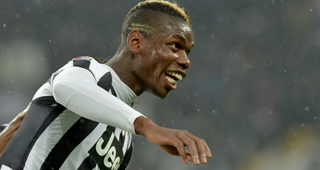If Sir Alex Ferguson had his way, Paul Pogba would currently be starring in Louis van Gaal's midfield, continuing the tradition of United midfield mastery for the next decade. It was Ferguson who, in the latter stages of the 2012 season, sent Patrice Evra and Rio Ferdinand to mentor and convince Pogba to stay with the club. Whether it was due to his agent’s influence, as Ferguson claims, or Paul Scholes coming out of retirement and taking his place in midfield, Pogba left that summer for Juventus. The impact of losing a once in a generation talent continues to affect United to this day (in another world, their side would be powered by a midfield duo of Pogba and John Obi Mikel).
Ferdinand tipped him to become the best player in the world, while Ferguson accused Pogba of disrespecting the club. Gigi Buffon called the saga one of the “the strangest things” he had ever seen. The topsy turvy early career of Pogba almost took another turn yet again last summer. There were reports that Juventus and Barcelona had agreed to a January deal before the season, although his agent (who Ferguson single handedly picked out for scorn) put any rumors of a winter move to rest. Regardless, as Chris Reina points outs, a transfer market move for Pogba represents the ultimate “financial heatcheck” for any top club.
Juventus’ reported nine figure demands for Pogba’s signature looked out of depth as the club opened the season with two losses. The most obvious reason for the early struggles were the loss of Carlos Tevez, Arturo Vidal and Andrea Pirlo from last season’s side, with replacements either injured (Sami Khedira) or not quite up to previous standards (Hernanes, Simone Padoin). The steady head of Marchisio was vastly missed and the importance that continuity played in last season’s success cannot be overstated. As James Yorke outlined in his piece on the team’s early struggles, Pogba was at one point the only player in the front six who had played more than 65 percent of Juventus’ minutes.
Pogba did himself no favors in playing down expectations. He usurped the #10 jersey from Carlos Tevez, a gesture symbolic of his move from the third midfielder to center of his team’s playmaking attention. Yet the pressure of replacing both Vidal and Marchisio as leader and engine of the midfield resulted in Pogba doing too much at the beginning of the season as he was statistically outplayed by Stefano Sturaro and Roberto Pereyra. It’s no coincidence that Juventus’ latest run of four straight league wins coincided with Marchisio’s return. And just like that, the side are only seven points from the top of the table, and remain unbeaten in Champions League group play.
-----------------------------------------
Patrick Vieira is the easy comparison for any box to box midfielder, Pogba included. But what Pogba make lack in Vieira’s defensive steel and positioning, he makes up for with footwork, mazy dribbles through midfield, and assists with the outside of his right foot. And he’ll be relied upon for goals. Juventus would certainly “settle” for Pogba being the next Arturo Vidal.
There are few better personalities to develop alongside than Marchisio’s selflessness, allowing Pogba to take the positional and passing risks of a #10. Likewise, with his development under Antonio Conte and Massimo Allegri’s 3-5-2 system, the three midfield approach that is ingrained in this Juventus era may be best suited for him to continue growing as a player. Of course, if the rumors are true, he would be thrilling at midfield alongside Iniesta and Busquets (in addition to signing strikers, Barcelona look outside La Masia for the physical link in midfield with the likes of Ivan Rakitic, Adriano, Seydou Keita and Yaya Toure).
Yet as much as Massimo Allegri has taken blame for the manner which the season started, he continues to find slight tactical tweaks to improve Pogba’s positioning off the ball. It would have been interesting to see Ferguson handle his development, but Allegri set a high bar for expectations. He also has the vast archives of Juventus history watching over him, like Pavel Nedved, who demanded that he show more less style and more concreteness to his game. Pogba can fill a 10 minute YouTube compilation as well as any player, but his development not only lies in 30 yard blasts but in the smaller fundamentals of controlling the rhythm of play, creating space for his teammates as he demands more and more attention, and influencing matches out of his sheer presence.
Potential is as much a burden as it is a promise. Tasked with more responsibility than he’s ever had this season at Juventus, Pogba responded after a slow start with a consistency in his passing, dribbling, and midfield presence that Ferguson tried so hard to keep years ago. But more than just skills, he’s also growing into his role as a team leader, aiming for the maturity and drive of Tevez that was so essential to the side’s success last season. Paul Pogba is becoming concrete.



